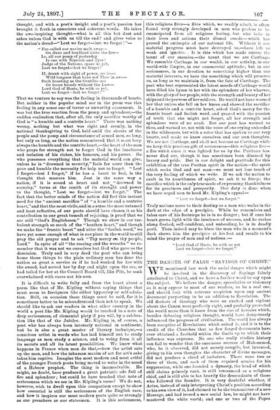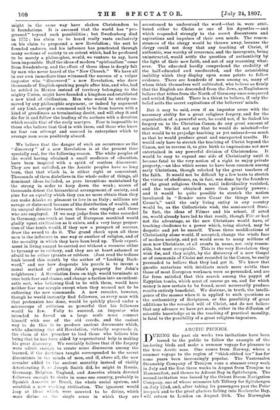THE DANGER OF FALSE "SAYINGS OF CHRIST."
WE mentioned last week the social danger which might be involved in the discovery of Sayings falsely attributed to Christ, and we have a further word to say upon the subject. We believe the danger, speculative or visionary as it may appear to most of our readers, to be a real one, and should look with extreme suspicion upon any ancient document purporting to be an addition to Revelation. The old doctors of theology who were so excited and vigilant about the Canon were perfectly right, and probably protected the world more than it knew from the rise of heresies which, besides debasing religious thought, would have dangerously influenced the progress of civilisation. The world has always been receptive of Revelations which suited it, and it is to the credit of the Churches that so few forged documents have ever obtained a foothold within the limits up to which their influence was supreme. No one who really studies history can fail to wonder that the enormous success of Mahommed, who, be it observed, did not merely compile, but invented, giving to his own thoughts the character of divine messages, did not produce a cloud of imitators. There were two or three of them, and each of them required armies for his suppression, while one founded a dynasty, the head of which still claims princely rank, is still reverenced as a religions chief, and is still able to tax heavily the descendants of those who followed the founder. It is very doubtful whether, if Arius, instead of only interpreting Christ's position according to his own view of it, had claimed to be the transmitter of a new Message, and had issued a new social law, he might not have
the white world; and one or two of the Popes
might in the same way have shaken Christendom to it foundations. It is assumed that the world has "pro- 'greased" beyond such possibilities; but Swedenborg died in 1772 ; his claim to be heard really rests exclusively on his claim to propound a new Revelation ; the sect he founded endures, and his influence has penetrated through many sections of society to an extent which, had he professed to be merely a philosopher, would, we venture to say, have been impossible. Half the ideas of modern "spiritualism" come -from Swedenborg, and the effect of those ideas is deeply felt by men who never heard of the "New Church." We have all in our own immediate time witnessed the success of a vulgar impostor who "discovered" a new Revelation, who drew thousands of English-speaking people after him, and who, had he settled in Mexico instead of territory belonging to the mighty Union, might have founded a kingdom and established a new kind of civilisation. Men who would be utterly un- moved by any philosophic argument, or indeed by argument of any kind, accept a command said to be from heaven with a kind of greediness as terminating doubt, and will obey it and die for it and follow the leading of its authors with a devotion which recalls that of the early martyrs. Fear is impossible to those who believe that God is with them, and those who know no fear can attempt and succeed in enterprises which to average men seem positively absurd.
We believe that the danger of such an occurrence as the " discovery " of a new Revelation is at the present time specially real, for the following reason. The white peoples of the world having obtained a small modicum of education, have been inspired with a spirit of restless discontent. They are not satisfied, as the Asiatic peoples have so long been, that that which is, is either right or convenient. Thousands of them disbelieve in the whole order of things, all dominant ideas included, as pure inventions maintained by the strong in order to keep down the weak ; scores of thousands detest the hierarchical arrangement of society, and pine for an equality which they can no more obtain than they can make Alaska as pleasant to live in as Italy ; millions are savage or distressed because of the distribution of wealth, and its unequal division hetweeen those who employ and those -who are employed. If we may judge from the votes recorded in Germany, one-tenth at least of European mankind would gladly upset civilisation as it exists, and a very large propor- tion of that tenth would, if they saw a prospect of success, draw the sword to do it. The grand check upon all these men is the influence in one way or another of religion, and of the morality in which they have been bred up. Their experi- ment in living cannot be carried out without a recourse either to tyranny or to robbery, and they are at heart ashamed or afraid to be either tyrants or robbers. (Just read the tedious book issued this month by the author of "Looking Back- ward," and see how desperate his puzzle is to invent a moral method of getting John's property for John's neighbours.) A Revelation from on high would terminate at once both fear and shame, and change a faction into an enthusi- astic sect, who believing God to be with them, would have neither fear nor scruple except when they seemed not to be enforcing the new commands. A new revealer, however, though he would instantly find followers, as every man with that pretension has done, would be quickly placed under a microscope of criticism so powerful that his followers would be few. Fully to succeed, an impostor who intended to found on a large scale must connect himself with one of the old creeds, and the easiest way to do this is to produce ancient documents which, while admitting the old Revelation, virtually supersede it, the claim of the preacher to lead those who believe him being that he has been aided by supernatural help in making his great discovery. We veritably believe that if the forgery were adroit enough to create some discussion among the learned, if the doctrines taught corresponded to the secret discontents in the minds of men, and if, above all, the new revealer added to the ancient morality instead of visibly deteriorating it, an Joseph Smith did, he might in Russia, Germany, Belgium, England, and America obtain devoted followers enough to shake in some one country, probably in Spanish America or Brazil, the whole social system, and establish a new working civilisation. The ignorant would leap at ideas which were asserted to be divine, which -were divine in the single sense in which they are
accustomed to understand the word—that is, were attri- buted either to Christ or one of his Apostles—and which responded strongly to the secret discontents and aspirations and impulses of their own minds. The remon- strances of the clergy would be thrown away, because the clergy could not deny that any teaching of Christ, if authentic, was worthy of reverence, and the insurgents, being uninstructed, would settle the question of authenticity by the light of their new faith, and not of any reasoning what- ever. The educated hardly comprehend the credulity of the half-educated and uneducated, and the astonishing inability which they display upon some points to follow evidence. There are hundreds of men among us, many of whom think themselves well cultivated, who believe as firmly that the English are descended from the Jews, as Englishmen believe that tribes from the North of Germany once conquered and settled England. There is a thirst to believe, if only the belief suits the secret aspirations of the believers' minds.
But it may be said, even if an impostor arose with the necessary ability for a great religious forgery, and for the organisation of a powerful sect, he could not, if he linked his forgery on to the Christian Canon, do any great amount of mischief. We did not say that he would do mischief—for that would be to prejudge teaching as yet unheard—so much as that he would produce great and unexpected results. He would only have to stretch the teaching of Christ beyond the Canon, not to reverse it, to give birth to impressions not now entertained in any powerful division of Christendom. It would be easy to expand one side of Christianity until it became fatal to the very notion of a right to enjoy private property,—an idea which seems to have been common among early Christians, though rebuked by the great teachers of the faith. It would not be difficult by a few texts to stretch the virtue of obedience, as, in fact, was done by the founders of the great religious Orders, until individuality vanished, and the teacher obtained more than princely powers ; and it would be quite possible to stretch the notion inculcated in "Render unto Cmsar the things that are Ceasar's," until the only living entity in any country would be, as the Collectivists wish, the semi-sacred State. In fact, the ideas of Filmer and his school, if acted on, would already have led to that result, though Filrler had not the advantage, as the new Christians would have, of teaching obedience to a power which, being elected, may be despotic and yet be oneself. Those three modifications of Christianity alone would, if accepted, change the whole face of modern society, and yet would seem to many millions of men now Christians, at all events in name, not only reason- able, but most acceptable. This is the very Revelation they wish for, and they might, by the discovery of a new Gospel or of commands of Christ not recorded in the Canon, be easily persuaded to believe that they had got it. We know that gnostic sectarians with intellects much more subtle than those of most European workmen were so persuaded, and are far from satisfied that this search among the papyri of Egyptian tombs, which must of course go on, and for which money is now certain to be found, must necessarily produce results entirely beneficial. We distrust, in truth, the intelli- gence of the masses when it is applied to such questions as the authenticity of Scriptures, or the possibility of great additions to the revealed will of Christ, and do not believe that any advance we have yet made, either in the diffusion of scientific knowledge or in the teaching of practical morality, is fatal to the possibility of a great religious imposture.



































 Previous page
Previous page